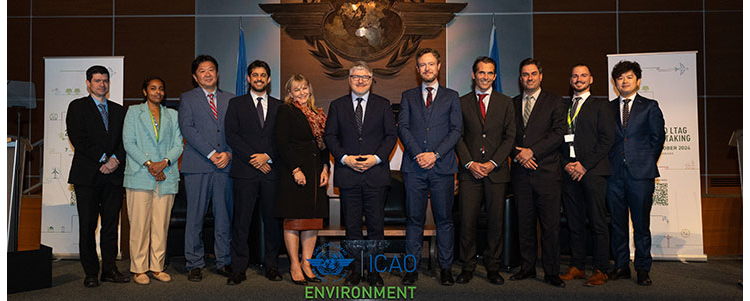Supported by the International Civil Aviation Organization (ICAO), the global aviation sector has continued its efforts to achieve net-zero carbon emissions by 2050.
The 2024 ICAO Long-Term Aspirational Goal (LTAG) Stocktaking, ICAO’s sixth such event, brought together close to 400 participants last week to exchange expertise, showcase successful projects, and identify priorities in response to the urgent need for action on decarbonization in the aviation sector.
The four-day event, held at ICAO’s Montréal Headquarters, featured 90 panelists representing a diverse range of stakeholders including governments, aviation and energy sectors, research institutions, start-ups, financial institutions, and civil society organizations.
«We gather to address one of aviation’s most significant challenges: achieving net-zero carbon emissions by 2050. We are here to share progress, learn from each other, and chart our path forward. This Stocktaking event represents another important step in our journey towards this ambitious target,» remarked Salvatore Sciacchitano, President of the ICAO Council.
The event covered a wide range of crucial topics. Panel discussions focused on the latest developments in aircraft technologies, hydrogen use in aviation, operational improvements, and airport infrastructure. Several sessions were also dedicated to Sustainable Aviation Fuels (SAF), addressing policies, partnerships, sustainable certification, accounting, implementation support, and financing. Common themes included the importance of involving all stakeholders, and the role of ICAO in the development of harmonized policies to support the energy transition.
ICAO Secretary General Juan Carlos Salazar emphasized the importance of showcasing the aviation sector’s commitment to sustainability: «We have to increase our outreach regarding our efforts and successes, highlighting aviation as a responsible sector, with concrete pathways towards net-zero, and prioritizing the aviation sector in the minds of policy and decision makers in all levels of government.»
The event also highlighted the ICAO Global Framework for Sustainable Aviation Fuels (SAF), Lower Carbon Aviation Fuels (LCAF), and other cleaner energy sources for aviation. Discussions tracked the progress of the ICAO Roadmap on the implementation of these initiatives, with the launch of tools tracking the progress of the Global Framework across its four Building Blocks (Policy and Planning, Regulatory Framework, Implementation Support, and Financing).
The event showcased the ICAO Finvest Hub, a new initiative to connect aviation decarbonization projects with potential investors. Highlighting that it will feature a comprehensive database of funding and financing sources, ICAO Secretary General Juan Carlos Salazar remarked that «the ICAO Finvest Hub is our contribution to facilitate financing for the decarbonization of the aviation sector.” The Hub is designed to streamline the vast amount of information available, making it more accessible to energy developers, fuel producers, and energy infrastructure managers, while also promoting cooperation on risk mitigation mechanisms for early-stage project planning.
Discussions furthermore focused on the ICAO Assistance, Capacity Building and Training for SAF (ACT-SAF) programme which will help accelerate the delivery of implementation support where it is needed most. The ACT-SAF programme features over 200 partners, furthering key initiatives in training, feasibility studies, business implementation, and ongoing support for SAF production. ICAO is actively advocating for expanded partnerships through ACT-SAF to ensure an inclusive green transition for global aviation.
As the aviation sector progresses towards its net-zero emissions goal for 2050, events like the ICAO LTAG Stocktaking will continue to be instrumental in fostering collaboration, sharing knowledge, and accelerating the implementation of sustainable solutions across the industry. The Stocktaking will notably inform discussions among ICAO’s 193 Member States at the next session of the ICAO Assembly, taking place in Montréal in September 2025.



